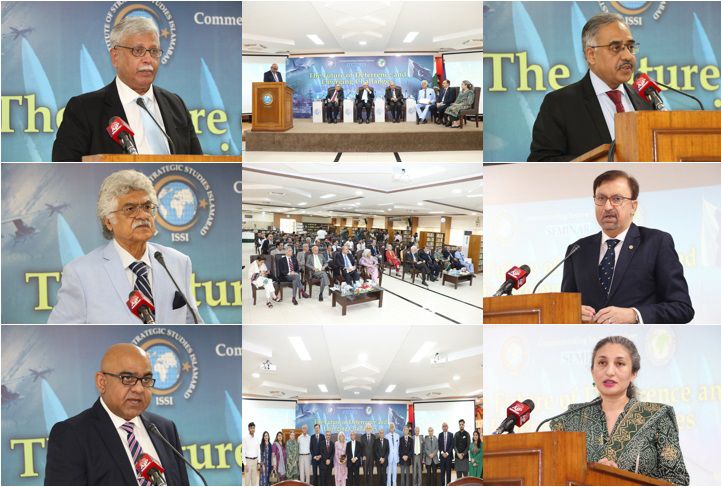ISLAMABAD: The Institute of Strategic Studies Islamabad (ISSI), through its Arms Control and Disarmament Centre (ACDC), commemorated the 27th anniversary of Youm-e-Takbeer by organizing a seminar.
The seminar, “The Future of Deterrence and Emerging Challenges” featured senior defense and strategic experts and explored South Asia’s evolving security dynamics.
Lt. Gen. (R) Khalid Ahmed Kidwai, Advisor to the National Command Authority (NCA) and former Director General of the Strategic Plans Division (SPD), delivered the keynote address.
He emphasized that a “new normal” has emerged in South Asia following the recent 87-hour India-Pakistan military escalation, which tested both countries’ conventional and nuclear deterrents. He highlighted the Pakistan Air Force’s decisive role in the conflict, noting its dominance through advanced Chinese technology and integrated multi-domain operations.
According to Gen. Kidwai, air superiority has shifted in Pakistan’s favor, reshaping regional deterrence and strengthening Pakistan’s conventional posture as a complement to its nuclear capabilities.
He reaffirmed that Pakistan’s nuclear deterrent remains the cornerstone of national security and strategic stability. The doctrine of ‘Quid Pro Quo Plus’, he explained, ensures calibrated and escalatory responses to any Indian misadventure. He noted that Pakistan’s responses in 2019 and 2025 demonstrated its political will and military capability, deterring further Indian aggression.
Director General ISSI, Ambassador Sohail Mahmood, stressed the historical significance of Youm-e-Takbeer, highlighting that Pakistan’s nuclear program was a necessity rooted in existential security needs.
He underscored Pakistan’s commitment to credible minimum deterrence, responsible nuclear stewardship, and peaceful nuclear applications, while warning of the growing regional volatility due to India’s pursuit of MIRVs, sea-based deterrents, and counterforce strategies.
Ambassador Zamir Akram addressed India’s aggressive posturing and hybrid warfare tactics. He praised Pakistan’s firm military response, particularly during the May 2025 crisis, and emphasized the strategic importance of its partnership with China.
Air Commodore (R) Khalid Banuri examined the disruptive impact of emerging technologies such as AI, cyber warfare, and hypersonic weapons, calling for ethical and strategic preparedness.
Dr. Salma Malik highlighted the global transformation in deterrence due to emerging technologies and called for proactive diplomacy, particularly on Kashmir, to ensure regional peace.
The seminar concluded with a Q&A session and presentation of souvenirs by Ambassador Khalid Mahmood, Chairman ISSI Board of Governors.


Comments are closed.